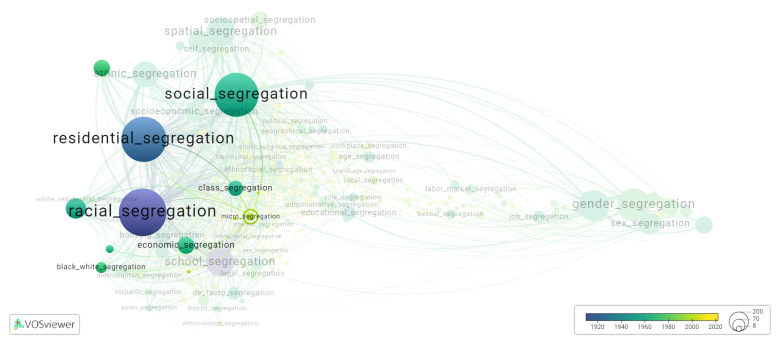Micro segregation
Date and country of first publication[1]
2006
Israel; United States
Definition
Micro segregation refers to the subtle ways in which individuals or groups are separated or segregated from each other based on certain characteristics such as race, gender, religion, or socioeconomic status. It can manifest in various forms, such as exclusion from social events, unequal treatment, or unconscious bias. Micro segregation can have negative effects on individuals' well-being and can perpetuate larger systems of inequality and discrimination.
Synonyms
The following terms are synonymous with:
micro level segregation; micro scale segregation; microscale segregation.
References and literature addressing this segregation form under these synonymous terms can be found below.
See also
Related segregation forms
Micro segregation is frequently discussed in the literature with the following segregation forms:
aspatial segregation, multigroup segregation, metropolitan area segregation, asian white segregation, black white segregation, hispanic white segregation, rural segregation, local area segregation, residential income segregation, multiscale segregation
 For the complete network of associated segregation forms, see:
clusters https://tinyurl.com/2d8wg5n3
year of publication https://tinyurl.com/2235lkhw
betweenness centrality https://tinyurl.com/223udk5r
disciplines where segregation forms first appeared https://tinyurl.com/244d8unz
For the complete network of associated segregation forms, see:
clusters https://tinyurl.com/2d8wg5n3
year of publication https://tinyurl.com/2235lkhw
betweenness centrality https://tinyurl.com/223udk5r
disciplines where segregation forms first appeared https://tinyurl.com/244d8unz
References
Notes
- ↑ Date and country of first publication as informed by the Scopus database (December 2023).
At its current state, this definition has been generated by a Large Language Model (LLM) so far without review by an independent researcher or a member of the curating team of segregation experts that keep the Segregation Wiki online. While we strive for accuracy, we cannot guarantee its reliability, completeness and timeliness. Please use this content with caution and verify information as needed. Also, feel free to improve on the definition as you see fit, including the use of references and other informational resources. We value your input in enhancing the quality and accuracy of the definitions of segregation forms collectively offered in the Segregation Wiki ©.
Micro segregation appears in the following literature
Jerby I., Semyonov M., Lewin-Epstein N. (2006). On measures of gender occupational segregation: Statistical and conceptual considerations (a response to Grusky and Levanon). Sociological Methods and Research, 34(4), 573-586. https://doi.org/10.1177/0049124106286333
Reardon S.F., Matthews S.A., O'Sullivan D., Lee B.A., Firebaugh G., Farrell C.R., Bischoff K. (2008). The geographic scale of metropolitan racial segregation. Demography, 45(3), 489-514. Duke University Press.https://doi.org/10.1353/dem.0.0019
Lee B.A., Reardon S.F., Firebaugh G., Farrell C.R., Matthews S.A., O'Sullivan D. (2008). Beyond the census tract: Patterns and determinants of racial segregation at multiple geographic scales. American Sociological Review, 73(5), 766-791. American Sociological Association.https://doi.org/10.1177/000312240807300504
Massey D.S., Rothwell J., Domina T. (2009). The changing bases of segregation in the United States. Annals of the American Academy of Political and Social Science, 626(1), 74-90. https://doi.org/10.1177/0002716209343558
Reardon S.F., Farrell C.R., Matthews S.A., O'Sullivan D., Bischoff K., Firebaugh G. (2009). Race and space in the 1990s: Changes in the geographic scale of racial residential segregation, 1990 2000. Social Science Research, 38(1), 55-70. https://doi.org/10.1016/j.ssresearch.2008.10.002
Keddie J., Tonkiss F. (201). The market and the plan: Housing, urban renewal and socio economic change in London. City, Culture and Society, 1(2), 57-67. https://doi.org/10.1016/j.ccs.2010.08.004
Parisi D., Lichter D.T., Taquino M.C. (2011). Multi scale residential segregation: Black exceptionalism and America's changing color line. Social Forces, 89(3), 829-852. https://doi.org/10.1353/sof.2011.0013
Flint S., Benenson I., Alfasi N. (2012). Between Friends and Strangers: Micro Segregation in a Haredi Neighborhood in Jerusalem. City and Community, 11(2), 171-197. https://doi.org/10.1111/j.1540-6040.2012.01397.x
Manley D., Johnston R., Jones K., Owen D. (2015). Macro , Meso and Microscale Segregation: Modeling Changing Ethnic Residential Patterns in Auckland, New Zealand, 2001 2013. Annals of the Association of American Geographers, 105(5), 951-967. Routledge.https://doi.org/10.1080/00045608.2015.1066739
Östh J., Clark W.A.V., Malmberg B. (2015). Measuring the scale of segregation using k nearest neighbor aggregates. Geographical Analysis, 47(1), 34-49. Blackwell Publishing Inc..https://doi.org/10.1111/gean.12053
Lichter D.T., Parisi D., Taquino M.C. (2016). Emerging Patterns of Hispanic Residential Segregation: Lessons from Rural and Small Town America. Rural Sociology, 81(4), 483-518. Rural Sociological Society.https://doi.org/10.1111/ruso.12108
Jaczewska B., Grzegorczyk A. (2017). Residential Segregation at the Local Level in Poland. Case Studies for Praga Północ, Włochy and Ursynów. Miscellanea Geographica, 21(4), 168-178. Faculty of Geography and Regional Studies, University of Warsaw.https://doi.org/10.1515/mgrsd-2017-0032
Barberis E., Violante A. (2017). School segregation in four Italian metropolitan areas: Rescaling, governance and fragmentation of immigration policy. BELGEO, -. Societe Belge de Geographie.https://doi.org/10.4000/belgeo.19018
Flint Ashery S. (2018). Schelling type micro segregation in a Hassidic enclave of Stamford Hill. Housing Studies, 33(7), 1038-1059. Routledge.https://doi.org/10.1080/02673037.2017.1414160
Flint Ashery S. (2019). Horizontal Examination: Micro segregation Mechanism in the Diverse Area of Whitechapel. Urban Book Series, 25-34. Springer.https://doi.org/10.1007/978-3-030-00602-0_2
Rogne A.F., Andersson E.K., Malmberg B., Lyngstad T.H. (202). Neighbourhood Concentration and Representation of Non European Migrants: New Results from Norway. European Journal of Population, 36(1), 71-83. Springer.https://doi.org/10.1007/s10680-019-09522-3
Flint Ashery S. (202). The hasidic communities of stamford hill and Canvey Island. Urban Book Series, 143-145. Springer.https://doi.org/10.1007/978-3-030-25858-0_11
Flint Ashery S. (202). The hasidic community of stamford hill: Non economic micro segregation. Urban Book Series, 93-122. Springer.https://doi.org/10.1007/978-3-030-25858-0_9
Underhill M.R. (2021). Managing Difference: White Parenting Practices in Socioeconomically Diverse Neighborhoods. City and Community, 20(2), 79-98. SAGE Publications Inc..https://doi.org/10.1177/1535684120981011
Maloutas T., Botton H. (2021). Vertical micro segregation: is living in disadvantageous lower floors in Athens’ apartment blocks producing negative social effects?. Housing Studies, -. Routledge.https://doi.org/10.1080/02673037.2021.2014414
Bharathi N., Malghan D., Mishra S., Rahman A. (2022). Residential segregation and public services in urban India. Urban Studies, 59(14), 2912-2932. SAGE Publications Ltd.https://doi.org/10.1177/00420980211072855
Ho H.K., Yip M. (2022). From micro to nano segregation: policy led vertical urbanism in Hong Kong. International Journal of Housing Policy, -. Routledge.https://doi.org/10.1080/19491247.2022.2148339
Quick M., Revington N. (2022). Exploring the global and local patterns of income segregation in Toronto, Canada: A multilevel multigroup modeling approach. Environment and Planning B: Urban Analytics and City Science, 49(2), 637-653. SAGE Publications Ltd.https://doi.org/10.1177/23998083211021419
